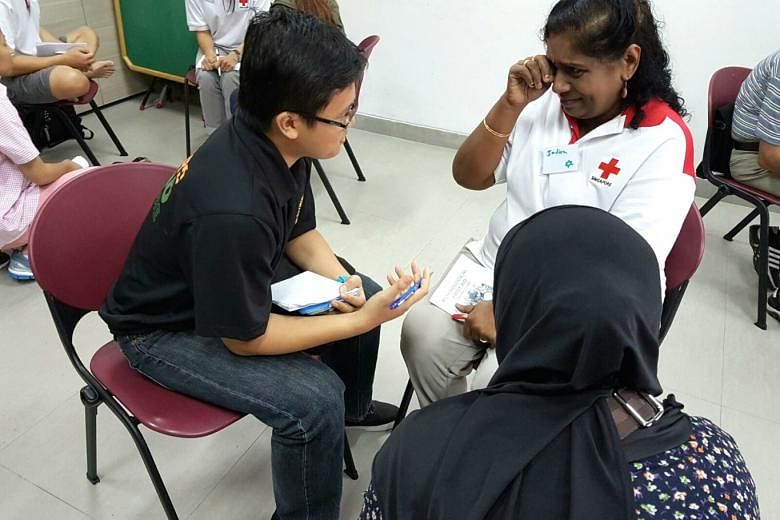SINGAPORE - A psychological first aid (PFA) course introduced in 2016 to help Singapore enhance community resilience and deal with national crises has seen a higher take-up during the Covid-19 pandemic.
Developed by the International Federation of Red Cross and Red Crescent Societies, the Psychosocial Support course teaches participants ways to help and support others with psychological or emotional problems or disorders.
It was the nation's first public training course in psychological first aid.
The course teaches people to identify signs of stress and support affected people, but is not meant to be professional counselling, said the Singapore Red Cross.
Five years on and amid an unremitting global pandemic, enrolment for this course has jumped almost five times to 1,300 for the past 10 months - up from 270 for all of 2020.
Ms Carmen Wong, 34, head of centre for psychosocial support at the Singapore Red Cross, has been teaching the PFA course for a year.
She said the skills imparted have become more relevant in pandemic times.
"There's now a lack of normalcy due to the pandemic - a loss of connections and routine which can bring about a lot of stress to different people," Ms Wong added.
"It isn't just individuals who are concerned about helping someone in their lives - we see more organisations that are looking to see how they can support their employees because of the transitions brought about by Covid-19."
Participants get basic training in spotting signs of stress in people around them, and learn how to provide emotional support by connecting with them in non-intrusive, compassionate ways.
The one-day course also highlights various resources and communities that are available in Singapore, such as the Institute of Mental Health (IMH) helpline.
Adjunct Associate Professor Clare Yeo Kwang Ngee, a senior principal clinical psychologist at IMH, said: "Speaking to someone who is PFA-trained can go a long way to help someone in distress feel better and be receptive to professional help for their issues."
Mr Girvan Tay, 24, took the course two years ago as he was already learning physical first aid and wanted to know more about the psychological side of it.
The medical student who has volunteered as a community responder with the Singapore Red Cross' home monitoring and eldercare programme since 2018 was quickly able to use his new PFA skills when engaging with the seniors.
In 2019, for instance, he was able to calm a man in his 60s who was distressed after falling down at home by speaking to him in a calm tone. The man had a neuromuscular impairment and was unable to get up by himself, but refused to go to the hospital.
Mr Tay also employed active listening and used non-verbal cues such as maintaining eye contact and leaning towards him to express his concern.
He managed to gently persuade the man to agree to be taken to hospital.
Another useful skill he picked up on the course is the ability to identify different feelings in others, he added.
People often think providing emotional support is a natural skill that does not need to be learnt, Mr Tay noted.
"On the contrary, it's actually quite difficult to identify what feelings someone is going through and to know what to say to someone who is in distress."
More than 3,000 people have taken the course since 2016.
Ms Sylvie Ta Higgs, 36, a marketing communications and public relations senior manager at Xylem South-east Asia, attended the PFA course through her company in August.
The course complemented her company's internal network to support mental well-being for employees by promoting open communication about mental health topics.
She said: "The pandemic has changed the way we talk to each other and the way we work.
"Some may have adapted well to it, but others who are home alone or have children doing home-based learning may be struggling more. So, there's no better time to talk about mental health."
SMRT has also rolled out PFA classes to all its employees on a voluntary basis since last year.
"Attendees have found the classes beneficial as they learnt the appropriate techniques to support themselves in times of need, and also be of service to others at work and at home," said Ms Tan Ai Ling, group chief human resources officer at SMRT.
The one-day Psychosocial Support course (https://redcross.sg/get-trained/psychosocial-support) runs for about six hours and costs $120.


